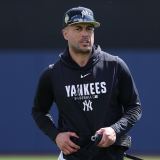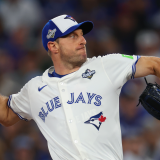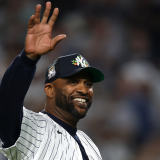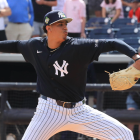
Hamilton's best spot is Texas, but here are 14 other possibilities
Josh Hamilton should stay where he is, but he's going to go through the free-agent process first, and if it's about money, he will probably go elsewhere.
By
Jon Heyman
•
6 min read
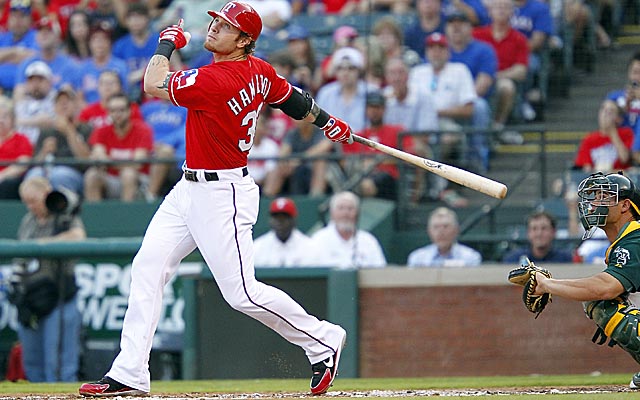 |
| At 31, Hamilton entered the weekend leading the American League with a .399 BA. (Getty Images) |
| More on Texas Rangers |
| Related links |
| More MLB coverage |
But of course, when a player of this magnitude gets to free agency, no matter the background, the odds are against him staying. Let's hope that isn't true this time. Hamilton's teammate David Murphy has said it's not about the money, but if the money really wasn't in the equation at all, presumably he'd have been signed by now.
Very little has come out about the negotiations, and the only snippets I've gathered to date are that Hamilton wants to be paid like an "elite'' player, which presumably means in the $200 million category of Albert Pujols, Joey Votto and Prince Fielder, and that the Rangers absolutely will not go to 10 years.
That, and that the issue is indeed about "terms and dollars," not contract language. While the language in this case might be of more interest and importance than most, ultimately it comes with no guarantees and often can be interpreted in one of at least a couple of ways.
It isn't known what the Rangers are offering, but their sweet spot for contracts seems to be five to six years. They ultimately offered Cliff Lee six years over Ryan's initial objections to stick to five; they lost a chance to sign Fielder because it's believed they wanted to keep it to around six years and he set a minimum of eight; they added five years to Ian Kinsler's contract; they signed Michael Young to a five-year deal; and they signed Adrian Beltre to a five-year deal that may turn into a six.
It isn't known whether the Rangers might make an exception to their seeming six-year rule with Hamilton, but it's pretty clear they won't blow him away, as the Reds did with Votto. To stay, Hamilton is going to have to acknowledge the advantage of remaining in the comfortable cocoon the Rangers have built for him, between the "life coach,'' the locale and the rest.
Hamilton's free agency could be the most interesting case ever. It's hard to imagine anyone bringing a more extreme mix of talent and (potential) trouble. To be fair, while he has had two cases that were termed "relapses'' in four-plus years with the Rangers, his issues haven't cost him any time in Texas, where he has made four All-Star teams in four years and received MVP votes in all but one year, including 2010, when he was the runaway winner.
And Hamilton's timing could not be better. He has again made himself into a prohibitive MVP favorite; he leads the American League in home runs (18), RBI (46), batting average (.384), slugging percentage (.788), OPS (1.225) and total bases (115). It's easy to see a lot of teams tempted by Hamilton, who turns 31 on Monday. But it'll be interesting to see which team owners have the necessary gambling gene.
"There's probably more teams that can afford him than are good fits,'' one baseball executive said.
Another interesting caveat is that many of the teams that can afford him may be exactly the worst fits, at least if you believe Hamilton is better off avoiding big cities. Here's an early rundown of some possibilities, from least likely landing spot to most:
15. Tigers. Owner Mike Ilitch has shown a willingness to spend. But they are already committed to three $20-million-plus players, so it seems remote.
14. Phillies. Shane Victorino is also a free agent, and if Cole Hamels goes, they might have the money. Long shot.
13. Orioles. They are showing they may be on the cusp of something special. But it's hard to see Buck Showalter's team finally dipping back into the free-agent market for a player who's such a risk.
12. Marlins. They do have that loot left over from the failed attempt at Pujols. Maybe they enjoyed their time in the winter spotlight last year.
11. White Sox. The Chisox took a spending break last winter, Jake Peavy is coming off the books, and they could use an offensive boost.
10 and 9. Yankees and Mets. The Yankees will come up whenever there's a monster free agent, and Nick Swisher is himself a free agent, leaving a potential outfield opening. But it's hard to imagine how they attain their goal of getting below a $189 million payroll for 2014 to reset their luxury tax rate while also signing Hamilton. The Mets need to save their coin for franchise man David Wright.
8. Red Sox. After a year's respite from the free-agent market (they spent $7.4 million total last winter), the high-revenue team can certainly afford it. But while they've had outfield injuries lately, their real issue is pitching, and an outfield of Carl Crawford, Jacoby Ellsbury and Hamilton would be the priciest on record.
7. Nationals. GM Mike Rizzo has emphasized pitching and defense, but Hamilton does solve their long-running center-field issue. The Lerners also have shown a willingness to spend, as they did in the case of Jayson Werth and tried to do in the case of Zack Greinke.
6, 5, 4. Braves, Royals, Brewers. These three places are seen as locales that may work best for Hamilton. but the Braves, who aren't too far from Hamilton's North Carolina roots, have kept their payroll at almost exactly $90 million for six years running, the Royals have greater pitching needs and the Brewers didn't spend it for their own guy, Fielder.
3. Dodgers. With the new ownership, all things are possible. They have the money and have promised to spend to win. Of course, they already are winning, and they have their own free-agent-to-be-outfielder in Andre Ethier to worry about. Also, new club president Stan Kasten has emphasized pitching and player development in the past. And some may wonder whether L.A. is the best fit for a country boy who's a recovering addict
2. Cubs. The traditional way to rebuild is to do it through the draft and amateur signings, and the new Cubs regime didn't make a big play for Pujols or Fielder last winter. But the new CBA, which limits the potential of those avenues, could cause a rethinking. Could you imagine the excitement on the North Side over Hamilton?
1. Rangers. They found a way to get the most out of Hamilton, surrounding him with a cocoon of mature leaders like Young, Kinsler and Beltre. Ultimately, they won't offer the most money. Hamilton hasn't always made the best choices. But if he's really not about the money, as Murphy suggested, this is the best spot for him.




